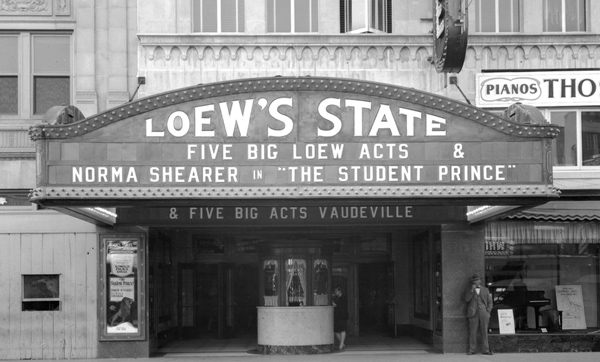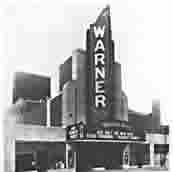Theatre Chains and Movie Studios




From Left: Paramount, Austin; Loew's, Houston; Warner, West Chester (PA); Fox, Atlanta
The result of the history that led from theaters to exchanges to studios was that until the U. S. v. Paramount decision of 1948, movie studios and theaters formed single organizations. If you wanted to see a Paramount movie, you needed (often) to go to a Paramount theater (ditto for others).
There were numerous independent theaters and chains but the studios required block-booking. Theaters had to commit to showing a full slate of a studio's features and shorts to get access to any of the studio's films. This guaranteed that all films would be profitable for the studios (but not the theaters) and led to large numbers of bad (and occasionally some really good) "B" movies.
Next: Hollywood
 In August 2020, the Department of Justice vacated the Paramount Consent Decree... the agreement that was made with the theaters and studios after US v. Paramount.
The DOJ argued that technology and the industry have changed so much that the agreement is no longer relevant or necessary. It is certainly true that streaming services like Netflix and Disney+ have already collapsed the distinction between film producers and film distributors that the Paramount case was partially concerned with. However, for movies and theaters, the effects could be large, particularly in smaller markets. About half of all movie screens in the US are controlled by three companies: AMC, Regal, and Cinemark. Together they control about 20,000 screens in the US. They control thousands more in Europe and South America. This gives them enormous negotiating power and they probably won't be much affected by overturning Paramount. However, the effect on small theater chains, many of which operate in smaller towns and cities, could be enormous. Because a huge percentage of the total revenues from movies is made by just a few blockbuster films, studios already have enormous power to dictate terms to smaller operators. Overturning Paramount will increase the power of the studios at the expense of these smaller operators. It's unlikely that one of the studios will purchase AMC or that they'll start investing heavily in rural movie theaters. Practices such as block booking are likely to return, and, probably, many small theaters are likely to close. You can hear an excellent podcast from the Wall Street Journal about this issue here.
In August 2020, the Department of Justice vacated the Paramount Consent Decree... the agreement that was made with the theaters and studios after US v. Paramount.
The DOJ argued that technology and the industry have changed so much that the agreement is no longer relevant or necessary. It is certainly true that streaming services like Netflix and Disney+ have already collapsed the distinction between film producers and film distributors that the Paramount case was partially concerned with. However, for movies and theaters, the effects could be large, particularly in smaller markets. About half of all movie screens in the US are controlled by three companies: AMC, Regal, and Cinemark. Together they control about 20,000 screens in the US. They control thousands more in Europe and South America. This gives them enormous negotiating power and they probably won't be much affected by overturning Paramount. However, the effect on small theater chains, many of which operate in smaller towns and cities, could be enormous. Because a huge percentage of the total revenues from movies is made by just a few blockbuster films, studios already have enormous power to dictate terms to smaller operators. Overturning Paramount will increase the power of the studios at the expense of these smaller operators. It's unlikely that one of the studios will purchase AMC or that they'll start investing heavily in rural movie theaters. Practices such as block booking are likely to return, and, probably, many small theaters are likely to close. You can hear an excellent podcast from the Wall Street Journal about this issue here.
I wrote the paragraph you just read just as the COVID-19 pandemic was beginning to have a big effect on movies. Theaters have changed since then. The best current ( early 2025) evidence is that the US has lost about 8% of its movie screens since 2019. In 2023, movie theaters in the US and Canada sold about 831 million tickets. That's a strong recovery from the depths of the pandemic, but a lot less than the 1.225 billion tickets sold in 2019, and an even greater drop from the 1.575 billion sold in 2002, the industry's best year. There are many things behind this but the facts that you can buy a basic 65 inch TV for under $400 and that many films are produced and distributed by streaming services are clearly two of them.




 In August 2020, the Department of Justice vacated the Paramount Consent Decree... the agreement that was made with the theaters and studios after US v. Paramount.
The DOJ argued that technology and the industry have changed so much that the agreement is no longer relevant or necessary. It is certainly true that streaming services like Netflix and Disney+ have already collapsed the distinction between film producers and film distributors that the Paramount case was partially concerned with. However, for movies and theaters, the effects could be large, particularly in smaller markets. About half of all movie screens in the US are controlled by three companies: AMC, Regal, and Cinemark. Together they control about 20,000 screens in the US. They control thousands more in Europe and South America. This gives them enormous negotiating power and they probably won't be much affected by overturning Paramount. However, the effect on small theater chains, many of which operate in smaller towns and cities, could be enormous. Because a huge percentage of the total revenues from movies is made by just a few blockbuster films, studios already have enormous power to dictate terms to smaller operators. Overturning Paramount will increase the power of the studios at the expense of these smaller operators. It's unlikely that one of the studios will purchase AMC or that they'll start investing heavily in rural movie theaters. Practices such as block booking are likely to return, and, probably, many small theaters are likely to close. You can hear an excellent podcast from the Wall Street Journal about this issue
In August 2020, the Department of Justice vacated the Paramount Consent Decree... the agreement that was made with the theaters and studios after US v. Paramount.
The DOJ argued that technology and the industry have changed so much that the agreement is no longer relevant or necessary. It is certainly true that streaming services like Netflix and Disney+ have already collapsed the distinction between film producers and film distributors that the Paramount case was partially concerned with. However, for movies and theaters, the effects could be large, particularly in smaller markets. About half of all movie screens in the US are controlled by three companies: AMC, Regal, and Cinemark. Together they control about 20,000 screens in the US. They control thousands more in Europe and South America. This gives them enormous negotiating power and they probably won't be much affected by overturning Paramount. However, the effect on small theater chains, many of which operate in smaller towns and cities, could be enormous. Because a huge percentage of the total revenues from movies is made by just a few blockbuster films, studios already have enormous power to dictate terms to smaller operators. Overturning Paramount will increase the power of the studios at the expense of these smaller operators. It's unlikely that one of the studios will purchase AMC or that they'll start investing heavily in rural movie theaters. Practices such as block booking are likely to return, and, probably, many small theaters are likely to close. You can hear an excellent podcast from the Wall Street Journal about this issue